Shapiro’s position on Gaza tests close bonds with Arab, Muslim community
The Democratic governor cultivated unprecedented ties with an oft-overlooked demographic in Pennsylvania. Now some feel ‘betrayed’ over Shapiro’s stance on the Gaza war
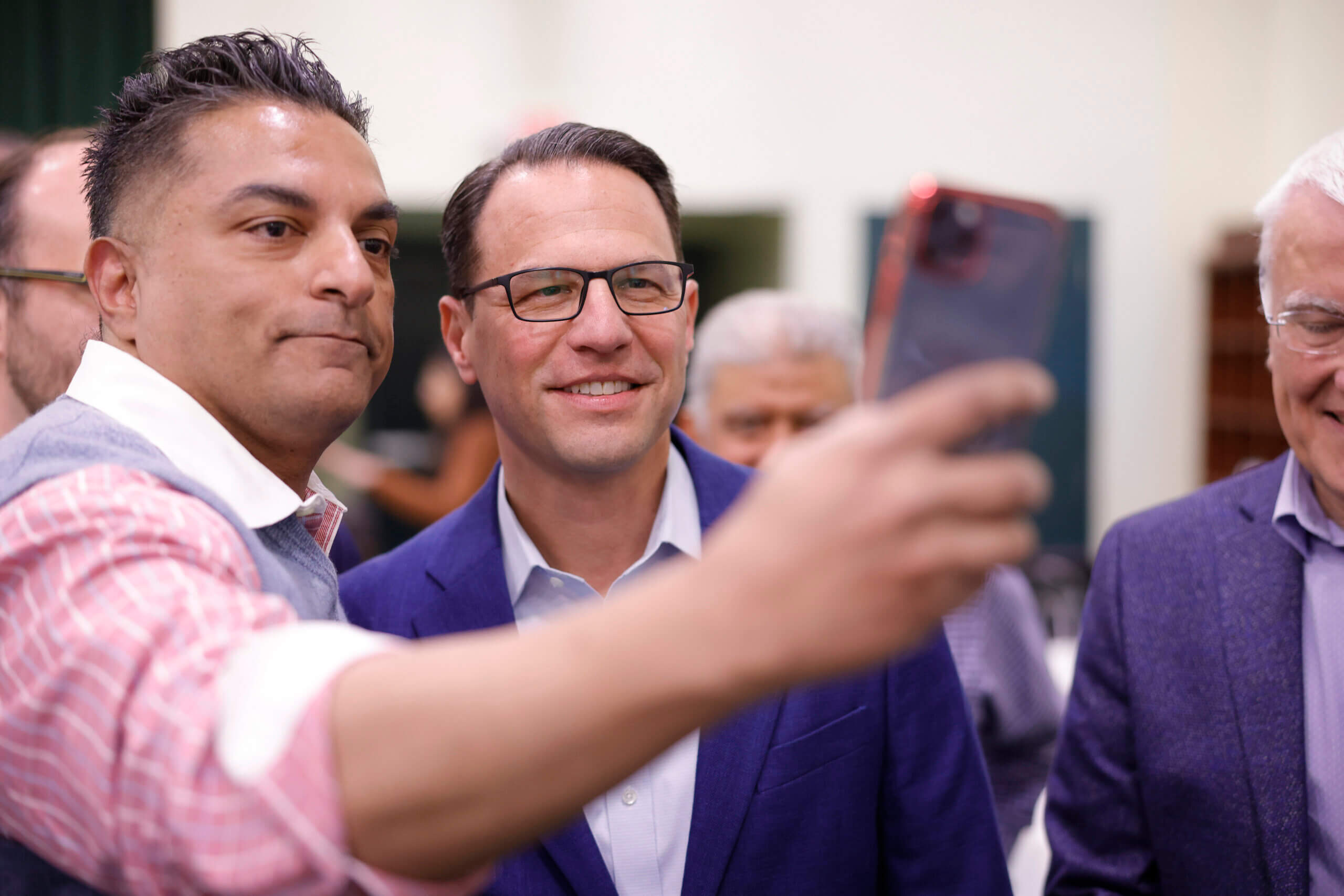
Gov. Josh Shapiro, the Pennsylvania Democrat, poses for a photo at the Muslim Association of the Lehigh Valley’s annual Iftar dinner last year. Shapiro built close relationships with Arab and Muslim residents of the state while serving as attorney general and running for governor. But those bonds have been tested since the Oct. 7 Hamas terrorist attack against Israel and subsequent war in Gaza. Photo by Commonwealth Media
For years, Gov. Josh Shapiro of Pennsylvania was able to execute a balancing act that eludes many Jewish politicians: vocally supporting Israel while maintaining close ties with Arab and Muslim voters.
After Shapiro became attorney general in 2017, he helped lead opposition to the Trump administration’s travel ban targeting Muslims. A longtime state representative, he regularly visited mosques and gave his personal cell phone number to Arab and Muslim community leaders, many of whom appreciated that he kept kosher and observed Shabbat.
When Shapiro ran for governor two years ago, the Philadelphia Inquirer reported that he was at the forefront of elected officials “paying attention” to a demographic that had long felt overlooked in the state. Pennsylvania has an estimated 126,000 Arab American residents, second only to Michigan among swing states expected to determine this year’s presidential election.
“A lot of other politicians, including Democrats, like to come take our money and move on — they’re not there to be seen with us,” Nagi Latefa, a community activist in the Lehigh Valley north of Philadelphia, told the newspaper. “But not Josh.”
The warm ties were all the more remarkable considering that Shapiro is a staunch opponent of the movement to boycott Israel, where he studied in high school and proposed to his wife. Ahmet Tekelioglu, Philadelphia director of the Council on American-Islamic Relations, said the community was also able to absorb Shapiro’s initial reaction to the Oct. 7 terror attack, with statements defending “Israel’s right to defend itself” that made no mention of Palestinians.
“People are not surprised he has a special relationship with Israel,” Tekelioglu said in an interview.
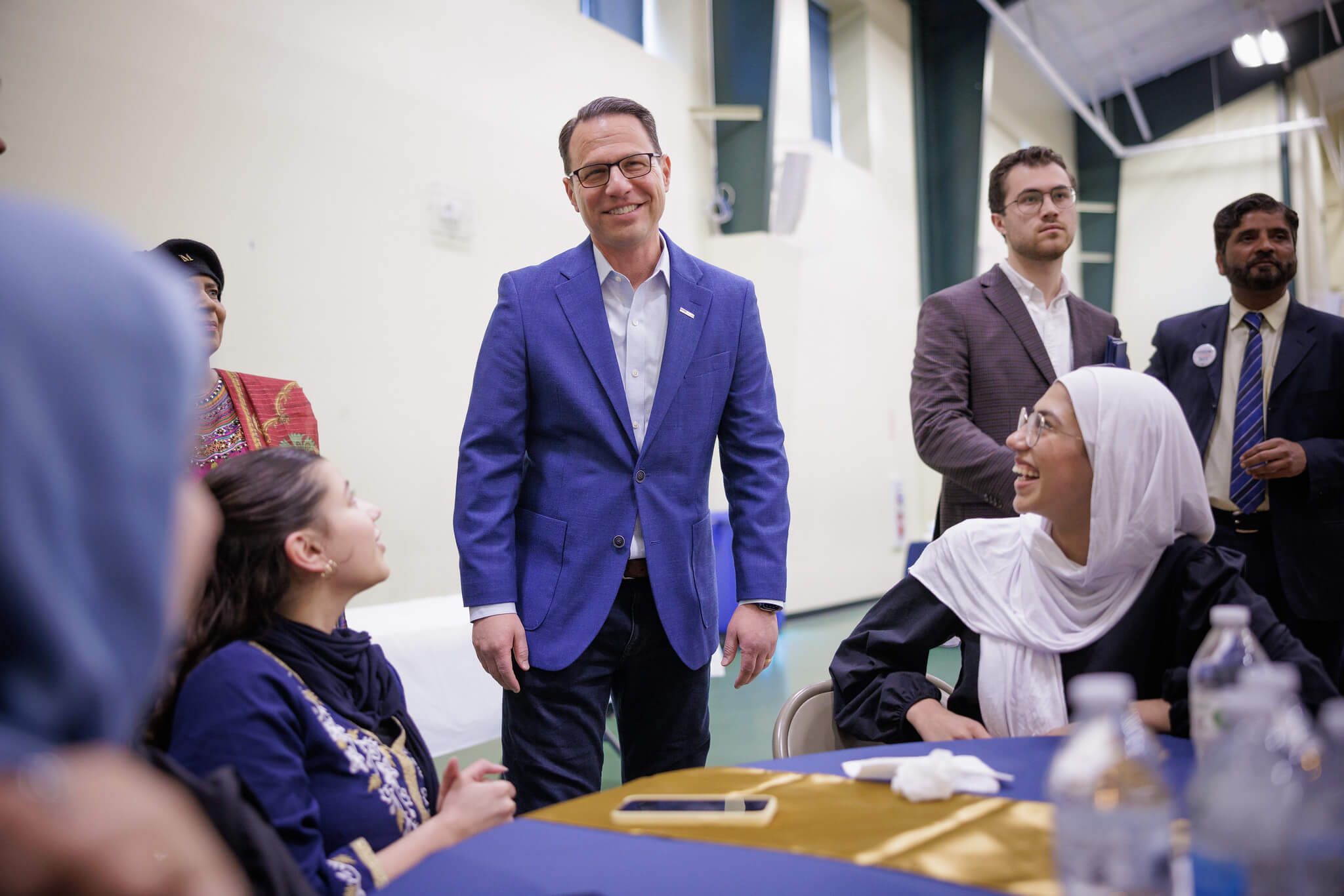
But the ties have frayed over the past 10 months of war in Gaza and intense debate over it here. Muslim and Arab activists — as well as some Jews critical of Israel’s response to the Hamas attack — have been disappointed by Shapiro’s framing of a broad swath of pro-Palestinian protesters as antisemites. He pushed the University of Pennsylvania to more harshly discipline faculty and student protesters, and pressed for its president to resign over her handling of anti-Zionism on campus.
“The governor’s perspective is not nuanced when it comes to Israel,” said Rabbi Rebecca Alpert, a retired professor at Temple University and a member of the anti-Zionist group Jewish Voice for Peace. Some of her activist friends, Alpert said, see the governor as “not paying sufficient attention to some of the complexities.”
Now Shapiro, who was the object of antisemitic attacks during his run for governor in 2022, is on the shortlist of contenders to become the Democratic nominee for vice president. That has put a spotlight on his record regarding the war in Gaza and its repercussions on college campuses here, issues that have frayed the coalition Vice President Kamala Harris needs to win in November.
“Our communities felt like they were betrayed by the governor after Oct. 7,” said Tekelioglu, who attended Shapiro’s inauguration two years ago. “Nobody in our community has any problem with him standing against antisemitism. But he has come to be seen as an anti-Palestinian person.”
Shapiro’s office did not respond to an interview request or questions about his comments about the Israel-Hamas war.
‘Special relationship’ with Israel
Shapiro, who went to Jewish day schools growing up and had the kitchen of the governor’s mansion kashered before moving in, has been a fixture at local rallies supporting Israel during its repeated wars in Gaza. Back in 2009, he spoke in downtown Philadelphia to 2,500 demonstrators waving signs like, “Let Israel defend itself.”
As Attorney General in 2021, he declared the boycott movement “rooted in antisemitism” as he sought to enforce Pennsylvania’s anti-boycott law against Ben & Jerry’s when it decided to stop selling ice cream in the occupied West Bank.
And Shapiro has been critical of pro-Palestinian protesters since shortly after the attack. Asked on Oct. 11 about demonstrations at Carnegie Mellon University in Pittsburgh, the governor said: “We all need to come together and recognize what is so clearly wrong, the acts of Hamas, and what is right, and that is Israel.”
“We need to gird ourselves for what appears to be, you know, going to be a long war and we need to remain on the side of Israel,” Shapiro told the radio host.
Shapiro stuck to that basic line as the death toll in Gaza mounted for months. He does not appear to have publicly expressed concern for Palestinian civilians until March, when the Washington Post asked him about concerns that President Joe Biden was losing support from Arab American voters. He also expressed empathy for the protesters in that interview.
Despite Hamas initiating the war, Shapiro said, “we also can’t ignore the death and the destruction that’s occurred in Gaza. For those who are peacefully protesting, I support their right to do that and I’ll defend that, and I want to make sure they feel heard. And I think in Pennsylvania, they do feel heard.”
Not everyone did.
Alpert, the Jewish Voice for Peace member, pointed to a December visit Shapiro made to Goldie’s, a falafel restaurant in Philadelphia owned by the renowned Israeli chef Michael Solomonov. Protesters marching through downtown had stopped outside the business and chanted: “Goldie, Goldie, you can’t hide, we charge you with genocide!”
Shapiro called the stunt a “blatant act of antisemitism — not a peaceful protest,” saying that Goldie’s was “mobbed because its owner is Jewish and Israeli.”
Former workers told The Guardian that Goldie’s was being protested because it had held an October fundraiser for United Hatzalah, an Israeli emergency medical service; ignored concerns raised by employees about Hatzalah’s support for the Israeli military; and fired two servers for wearing Palestinian flag pins.
A few days after the demonstration, Solomonov apologized to his staff for poor communication and said he had not realized that United Hatzalah sent equipment to the Israeli army.
“The protesters made some misjudgments in terms of what they were doing,” Alpert acknowledged. As for Shapiro, she said: “His concern about antisemitism is not easily distinguished from his concern about anti-Zionism.”
Shapiro’s record on antisemitism
Shapiro, 51, has told interviewers that one of his earliest memories of public advocacy came in the late 1970s, when he helped organize other Jewish children to write letters to “refuseniks,” Jews living in the Soviet Union who had been blocked from leaving the country. “These are memories that probably have led me into this life of service,” Shapiro told the Forward when he was running for governor.
Shapiro continued his advocacy on behalf of Jews while serving in the legislature from 2005 to 2012. He campaigned against Kaukab Siddique, a professor at Lincoln University who made social media posts railing against Israel and Jews, including denying the Holocaust.
“Siddique is not engaged in benign and thoughtful criticism of Israel,” Shapiro wrote in a 2010 letter to the Inquirer. “His writings make clear that he hates Jews and that he buys into the worst stereotypes of antisemitism.”
As attorney general, Shapiro made headlines for stating that President Donald Trump had appeared to suggest that a spate of bomb threats against Jewish community centers might have been staged to make him look bad.
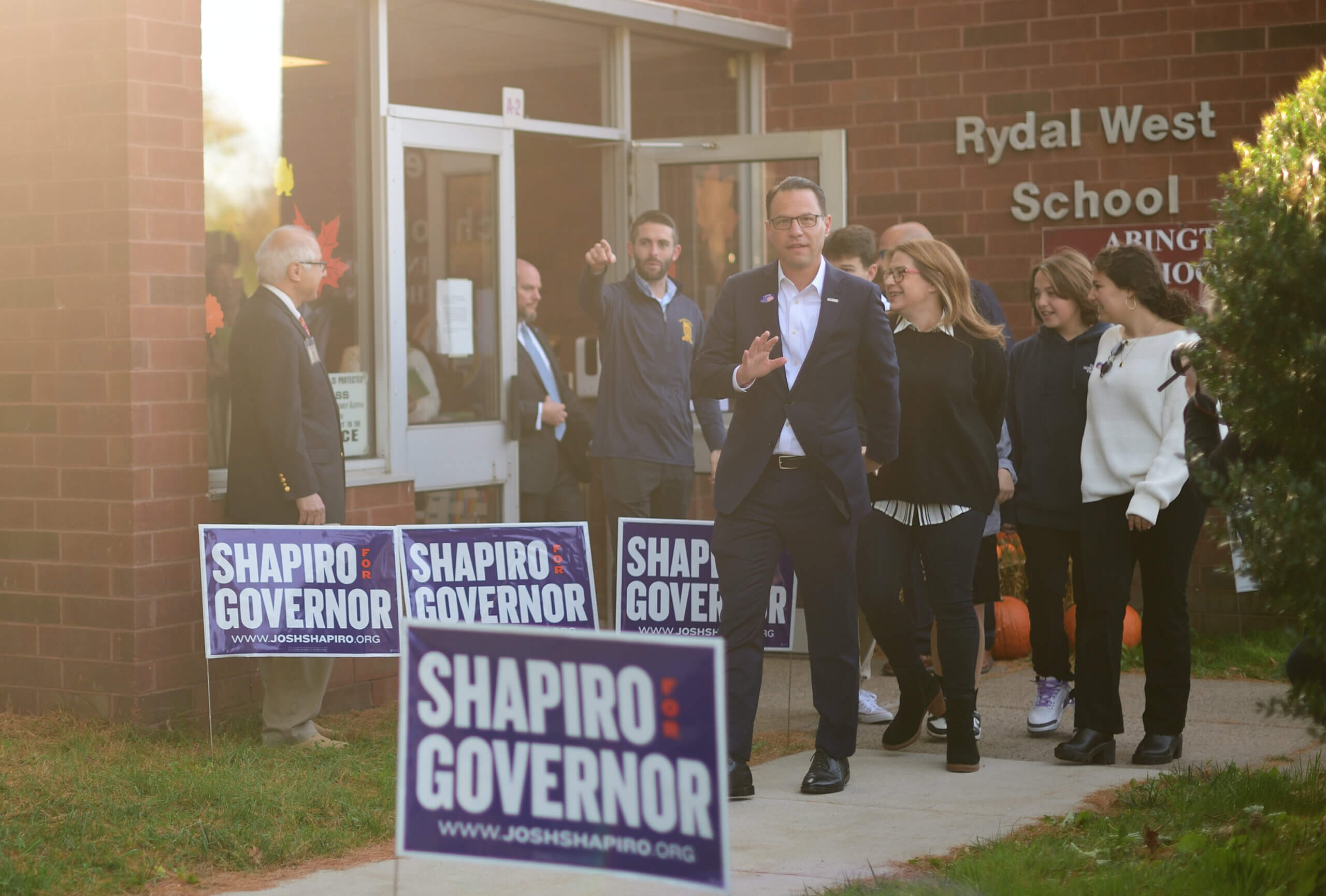
“He said, ‘You know, you’ve got to be careful, it could be the reverse,’” Shapiro recounted, describing a private meeting between Trump and state attorneys general. The exchange, along with the deadly Tree of Life synagogue shooting in Pittsburgh in 2018, catapulted Shapiro into the national spotlight amid concerns that Trump was stoking antisemitism.
(Police in Israel ultimately arrested an Israeli-American teenager for making thousands of bomb threats over two years after Trump directed the FBI to aid the investigation.)
Shapiro was the target of antisemitic jabs after he investigated child sex abuse within the Catholic Church in 2018, including questions about why a “non-Catholic” attorney was looking into the matter. He also suggested that another elected official, the reform-minded district attorney in Philadelphia, improperly referenced the Nazi era as the two tangled over policy and personnel in 2019.
The district attorney, Larry Krasner, had referred to prosecutors who left his office and went to work for Shapiro as “war criminals” fleeing to “Paraguay,” a reference to the fact that the country harbored Nazis after World War II. Shapiro quickly condemned Krasner’s “hateful speech,” saying “there is no place for comments like this in our society.”
During the 2022 gubernatorial race, Shapiro faced Republican Doug Mastriano, a far-right state lawmaker and Christian nationalist. National Jewish groups and news organizations called out Mastriano for comments that drew on antisemitic tropes.
Mastriano said, for example, that Shapiro “grew up in a privileged neighborhood and attended one of the most privileged schools in the nation as a young man” — he went to Jewish day schools — and that Shapiro has “disdain for people like us.”
Shapiro spent $1 million on an ad campaign highlighting Mastriano’s connections to Andrew Torba and the social-media platform Gab, decrying them as “antisemitic, alt-right extremists.”
New emphasis since Oct. 7
But since Oct. 7, Shapiro has directed more attention to allegations of antisemitism on the left. In addition to his condemnation of the protest outside Goldie’s, Shapiro has come down hard on campus protesters.
As Gaza solidarity tent encampments swept the country in the spring, Shapiro called for local police to intervene, saying “it’s absolutely unacceptable” that “universities can’t guarantee the safety and security of their students.”
“I do feel a somewhat unique responsibility to speak out when I see this level of antisemitism on our campuses and in our communities,” Shapiro told Politico in April.
He compared campus demonstrators to “a group of white supremacists” and said “it should not be hard for anyone on the political left or right to call out antisemitism.” In May, Shapiro ordered state workers to avoid “scandalous” conduct, which many interpreted as an attempt to stop them from participating in protests targeting Israel.
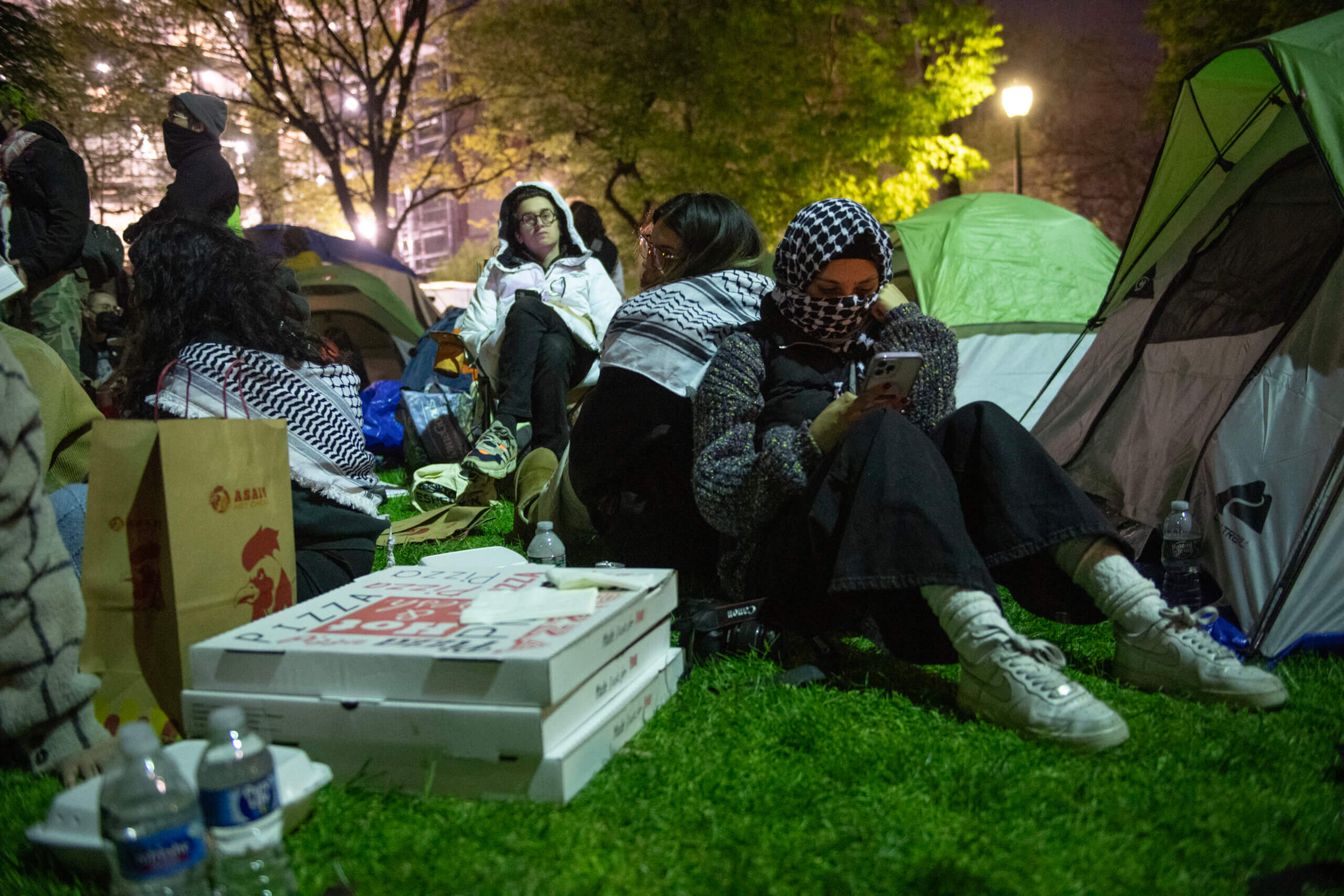
This approach has won him plaudits from many members of Pennsylvania’s organized Jewish community, including Jeremy Kazzaz, who runs a political action committee that scores local politicians on their stances regarding antisemitism.
Kazzaz praised Shapiro’s speech last month at the groundbreaking for the new Tree of Life campus in Pittsburgh.
“Governor Shapiro has the ability to look pretty unflinchingly at the problem of antisemitism and hate in all its forms and complexities,” Kazzaz said. “Hes’ shown a willingness to speak out when he sees it — not only when it is politically expediently or convenient.”
Shapiro has criticized members of his own party, including U.S. Rep. Summer Lee, a progressive Democrat from Pittsburgh who has clashed with local Jewish leaders, over her decision to attend a CAIR banquet last December.
Tekelioglu, the Philadelphia CAIR director, said it has sometimes been difficult to get Shapiro to speak out against incidents of Islamophobia related to the conflict. While the governor responded to the vandalism of a synagogue sign just hours after it was reported, for example, he took two days to comment on a man who pulled a gun and shouted slurs at pro-Palestinian demonstrators outside the state capitol.
“It took us some time behind the scenes to convince the governor’s office to denounce this action,” Tekelioglu said. “He gave some reasons for waiting we didn’t find convincing.”
Online outcry over Shapiro’s positions on Israel and antisemitism mounted this week as he emerged as a contender for the vice presidential nomination, with a campaign called “No Genocide Josh.”
Some of Shapiro’s supporters have suggested that the criticism is antisemitic, and the Harris campaign told Jewish Insider on Friday that “attacks based on anyone’s faith are un-American and unacceptable.”
Some ties transcend differences
Yet Shapiro has not abandoned his relationships with Arabs and Muslims in Pennsylvania.
After a group of Muslim leaders wrote an open letter condemning his position on the war in October, the governor met with them to discuss the concerns.
He often condemns both antisemitism and Islamophobia together in public statements, and hosted an Iftar during Ramadan in April. Tekelioglu boycotted the dinner.
“Many people who have supported his candidacy in the past could never see themselves supporting Governor Shapiro again,” he said.
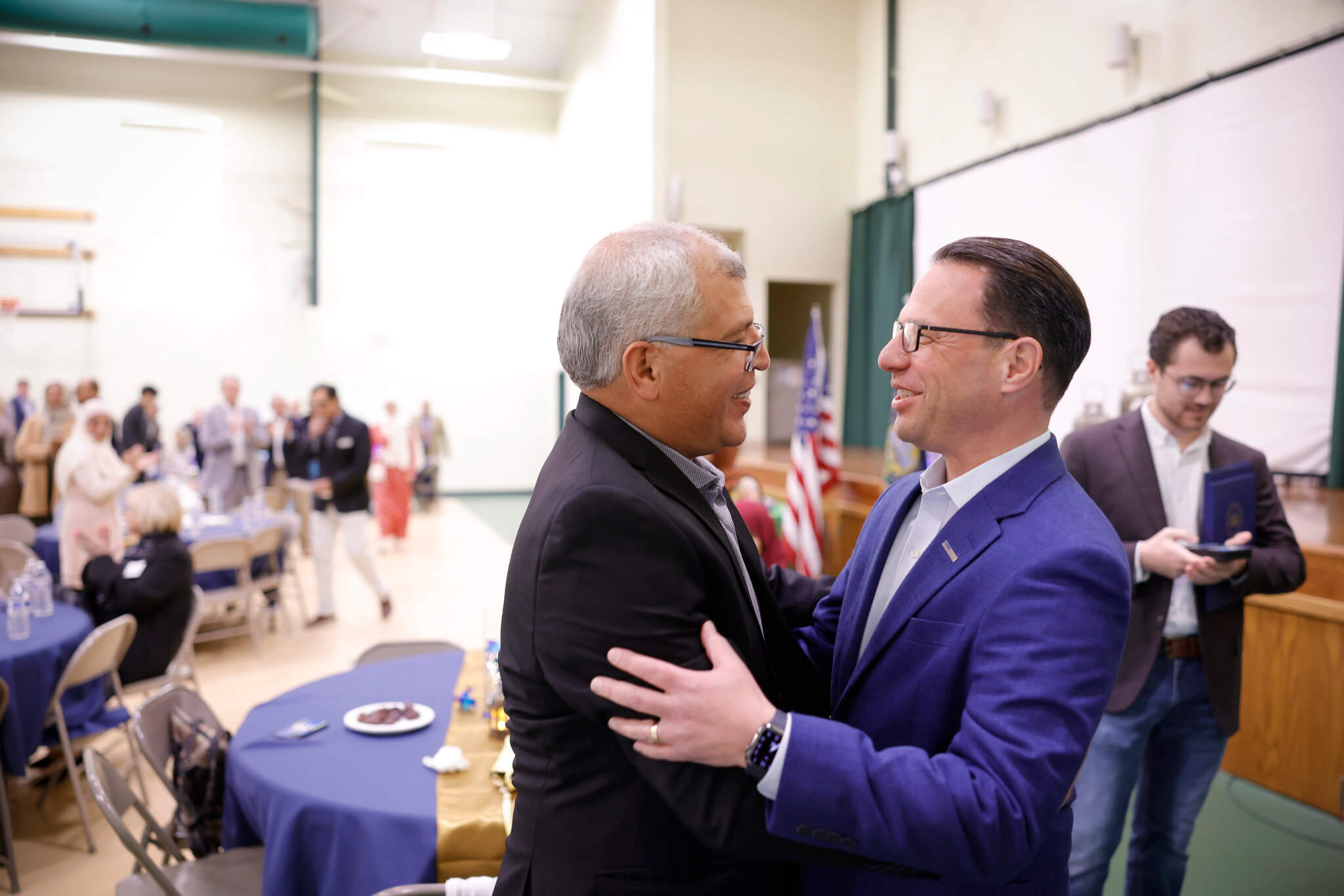
But Latefa, the Palestinian-American leader from Allentown who campaigned for Shapiro in 2022, said he remains supportive of the governor despite differences over Israel and Gaza. He noted that Shapiro called him personally to offer condolences after his mother, who lived in Gaza, died in October from cholera.
“I’ve been very comforted by some of the things he’s said to me in private,” said Latefa, who has other relatives still in Gaza and serves on the governor’s AAPI advisory commission.
“It is a big divide — I’m not going to mince words about it — a genocide is a genocide,” he continued. “I have family that is starving to death, people who just survived from bombings.”
Alpert, the rabbi who has participated in pro-Palestinian protests in Philadelphia, said that she thinks Shapiro is “a fine governor” and sincere in his convictions around Israel and antisemitism and that his statements since Oct. 7 have not been disqualifying.
“If he’s chosen as the vice presidential candidate I think that would be just fine,” she said. “That would give him a chance to modify or think about views a little bit more, because they would be challenged a little bit more.”
Correction, July 29, 10:26 a.m.: An earlier version of this article stated that Larry Krasner, the district attorney of Philadelphia, is Jewish. Krasner’s father was Jewish but Krasner has not described himself as Jewish.

















